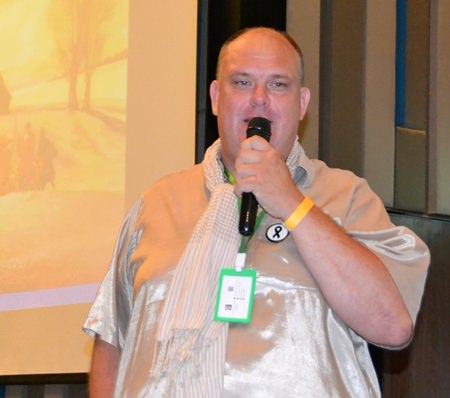
Pattaya City Expats Club was pleased to have a renowned prize-winning composer, Marcus Tristan, as the speaker at their September 24 Sunday meeting. He talked about his very interesting life and musical works. Specifically, he talked about eight compositions that he felt have been important milestones in developing his technique to introduce visionary music and vocal ensembles.

Marcus opened his presentation with a quiz. He pointed out that, towards the end of Ludwig van Beethoven’s life, he was asked which of his many compositions meant the most to him. Marcus asked the audience what they believed might have been the answer. After mentioning several symphonies to choose from, Marcus said he chose Sonata Number 24, a relatively humble piano piece that he treasured, but is not necessarily the same as the world treasures.
Marcus, a self-described child prodigy, mastered the art of composition at a very early age. He started to write music at the age of two and wrote his first extended musical composition at the age of six. He explained that he learned to compose music even before he could speak properly. He remembered being surrounded with the sounds of symphonies, played by his parents, from his earliest recollections. His father, an architect by trade, was a very competent, amateur-composer and wrote Christmas carols almost every year. His dad was either composing or transcribing works by people like Handel, constantly, then playing the music on his favorite instrument, a treble recorder.
He recounted an often-repeated story, that when his dad returned from work, he found a very young Marcus sitting on the floor writing notes. He asked him what he was doing, and he replied, “I’m writing my seventh symphony!” he was very fond of Beethoven’s Symphony no.7 at the time; at that age he obviously missed the mathematical concept that he needed to write the first six symphonies first.
Marcus graduated from The Royal Academy of Music in London, England, in 1990. It is the oldest conservatoire in the UK. While attending the Academy, he took private lessons with Oliver Messiaen and worked as a freelance composer and pianist in the Birmingham area. He played for and wrote dance pieces for an international group of dancers, including a young Russian dancer, Valentina, whom he later married.
Married to a lady from St Petersburg, Russia and that the sounds of all the magnificent Russian music by people like Tchaikovsky, Rimsky Korsakov, Mussorgsky and, particularly, Stravinsky, Prokofiev and Shostakovich had stayed with him since childhood, led him to living in St Petersburg. He worked with some of the best musicians in the world, such as a long-standing association with the Fitzwilliam String Quartet and the St Petersburg Chamber Choir, with Nicolai Korniev.

Tristan’s first work to cause a stir was “Vespers for Large Mixed Choir”, performed by the Birmingham Festival Choral Society in Symphony Hall in Birmingham in 1994 and is a symphony for voices, a piece in five movements. The idea for a piece called “Symphony for Voices”, slowly developed in is mind throughout the 1990s, during which, he worked with various vocal ensembles. He became an Associate Composer with the St Petersburg State Symphony Orchestra “Klassika”, between 2003 and 2009. He was approached by composer and choral conductor, Goncalo Lourenco, director of a choir called, Coro Odyssea, in Portugal and was commissioned to write the “Symphony for Voices”, which premiered in Lisbon, in April 2008. This whetted his appetite to investigate further the idea of works on a symphonic scale for voices.
He worked with some of the best musicians in the world, such as a long-standing association with the Fitzwilliam String Quartet, the St Petersburg Chamber Choir with Nicolai Korniev (who premièred a piece for 40 solo voices in the St Petersburg International Festival in 2009), the Coro Odyssea in Lisbon, and the inspirational Portuguese choral conductor, Goncalo Lourenco, who premiered Marcus Tristan’s “Requiem in Indianapolis”, in February 2013. He is currently working on Symphonies 10 and 11 for different orchestras, and he is also working on a sci-fi/esoteric opera called “Solntsegrad”, about a lone female cosmonaut orbiting close to the sun in her damaged spacecraft, a section of which is to be published by Scherzo Editions as a standalone piece.
Marcus then presented the eight compositions accompanied by excerpts and photos that he said developed his technique, starting with his first composition, from 1970 called “1 Minuet in E Flat”. The second composition, “Lux Aererna (1993)” is made up of two pieces, which are linked by musical and philosophical themes – the life of Christ. His third presentation and a crowd favorite, is “Fire for Orchestra” (1990), performed by the St Petersburg State Symphony Orchestra “Klassika”, conducted by Roman Leontiev and is based on the horrific fires in Australia. The fourth is “Sausato Dances, numbers 5 & 6”, which is a comparison between the Fitzwilliam String Quartet’s performance with the original Tielman Susato versions.
The fifth performance, “Symphony Number 6, Visions of Kitezh” (2006), again performed by the St Petersburg State Symphony Orchestra, “Klassika” and conducted by Roman Leontiev. Number six is “Symphony for Voices” (2009) is conducted by Nikolai Korniev. Number seven is “Solntsegrad Opera”, (2013), a piece for soprano, orchestra, piano and electronics, including a piano performance by Marcus. The eighth and most recent piece, is “Ave Verum Corpus” (2016), for choir and Guitar Quartet. Marcus Tristan then introduced his future endeavor, “Sinfonie Di dante” a Virgil, leading Dante into Circle 9, represented by the solo ‘cello and the flute, representing the spirit of Dante’s Museed.

After the presentation, MC Roy Albiston brought everyone up to date on upcoming events. This was followed by the “Open Forum” portion of the meeting, where questions are asked and answered and comments made about expat living in Thailand. For more information on the Club and their activities, visit www.pcec.club.
To view the presentation, visit: https://www.youtube.com/watch?v=SUae-pYsqU0.




